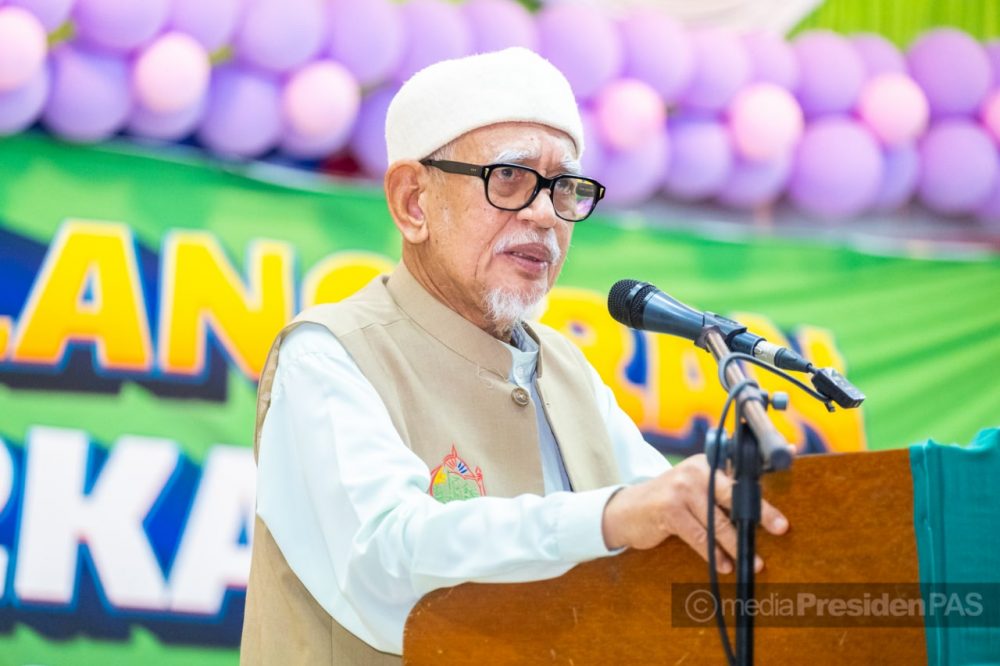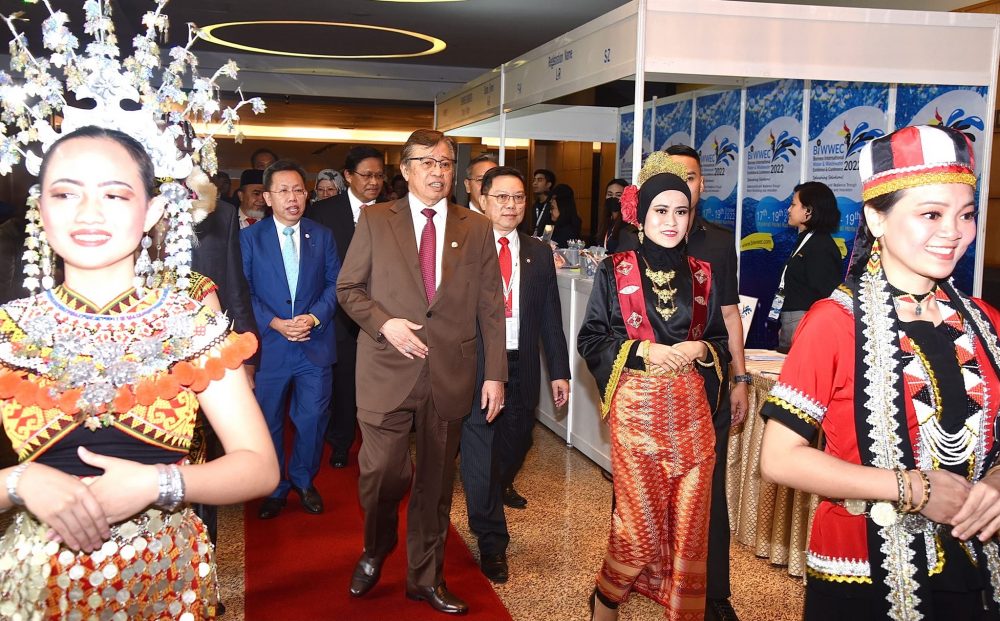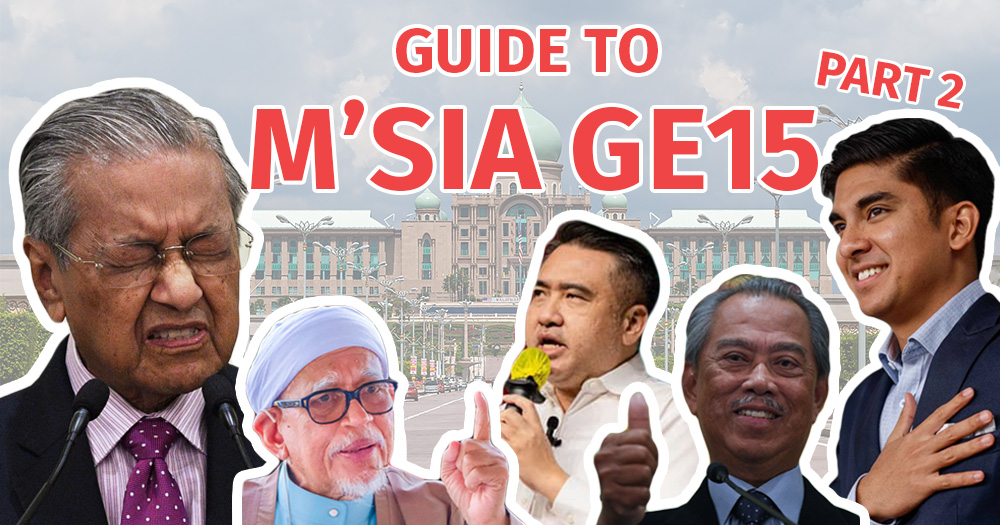Follow us on Telegram for the latest updates: https://t.me/mothershipsg
Welcome to Part 2 of Mothership's guide to the 2022 Malaysian general election, also known as GE15 or PRU15.
In our last edition, we discussed the major players, namely the Barisan Nasional (BN) and Pakatan Harapan (PH) coalitions, both of whom have previously won elections.
However, there is yet another coalition who recently got a taste of serving in government -- the Perikatan Nasional, led by former UMNO stalwart, former prime minister, and current boss of Bersatu, Muhyiddin Yassin.
Perikatan Nasional, the National Alliance
The Perikatan Nasional, one of Malaysian politics newest coalitions, got a taste of government power after the collapse of Pakatan Harapan.
Muhyiddin Yassin, a Bersatu man, served as prime minister before he was ousted by UMNO.
But in October, it was confirmed that PAS (Malaysia Islamic Party) would join PN, and contest against BN and PH, lending the coalition a fresh breath of life.
Bersatu
Bersatu, or Parti Pribumi Bersatu Malaysia, was formed by Mahathir Mohammad and Muhyiddin Yassin.
Both were former UMNO bigwigs, Mahathir having led the party and Muhiyiddin having served as Deputy President. This represented the most dramatic and pointed split within UMNO's political base since PAS itself split off decades before.
Joining with Keadilan and the DAP to form PH, it arguably gave PH credibility with Malaysia's Malay electorate, allowing the opposition to win seats in traditionally difficult areas: rural seats with Malay majorities.
These seats might have been disenchanted with the UMNO-led BN before, but, in their view, had little alternative to them, not trusting the secularist coalition of Keadilan and DAP. However, Bersatu mitigated that.
The Pakatan Harapan government, however, would fall in the debacle that was the Sheraton Move in early 2020.
The Move split Bersatu from Mahathir, and allowed Muhyiddin to become prime minister after allying with BN, before he was in turn ousted by UMNO.
It is not clear how much support Bersatu can expect going forward, having compromised on their initial anti-UMNO position.
PAS
The Parti Islam Se-Malaysia, PAS, is an Islamist party, a religiously focused pro-Malay party.
Arguably the most successful opposition party in Malaysia until 2018, it had wrested control of Kelantan and Terengganu from BN control, and is also in control of the Kedah state assembly.
But while popular on the East Coast and North of Malaysia, it always had trouble moving into the urban West coast and south.
The party is currently led by Abdul Hadi Awang.
 Photo from Hadi Awang's Facebook page.
Photo from Hadi Awang's Facebook page.
The Bersatu breakaways
While Bersatu has broken away from Pakatan Harapan, some of its members did not agree with the direction taken by the party.
Some familiar names have in turn broken away from Bersatu, and formed new parties.
MUDA
The Malaysian United Democratic Alliance (Muda) is a youth orientated party started by former cabinet minister Syed Saddiq. In a political environment where almost all of the leaders are above the age of 65, Saddiq is a rare young face with prominence.
Having split with Bersatu in the wake of its own split with PH, Muda is a multi-racial, secularist party.
While it has only recently confirmed its formal co-operation with PH, due to the party's history and principles, it has limited options for alliances.
Pejuang/GTA
Pejuang, or the Homeland Fighter's Party, is the political vehicle of Mahathir Mohammad. It belongs to the Gerakan Tanah Air (GTA) coalition of parties, also led by Mahathir.
Similar to Muda, it has a limited number of possible alliance partners, since it has not resolved its differences with Bersatu, and Mahathir believes that UMNO should be dissolved.
Mahathir is a strident champion of the Malay cause in Malaysia. But he has also criticised the Malay community in Malaysia on a number of occasions.
Mahathir is also 97, making his political participation a risky prospect. There have no been alternate leaders that have emerged from Pejuang.
Sabah and Sarawak parties growing in importance
The East Malaysian states of Sabah and Sarawak have a very different political dynamic to that of West Malaysia, and are now moving to become critical partners of parties that are looking to secure majorities in order take power.
Sabah and Sarawak joined with Malaya and Singapore in 1963 to form Malaysia. Likewise with Singapore, they had been given a promise of a high level of autonomy, and for Singapore, that promise was quickly insufficient.
But the East Malaysian states had a more mixed experience, and still remain part of the federation. While BN was still able to secure parliamentary majorities using West Malaysian seats alone, the politics of East Malaysia was not of immediate consequence.
However in 2018, this changed with PH securing their government with the help of Sabahan party Warisan.
Kingmakers of the East
With West Malaysian votes possibly being split between the three main coalitions, the odds of any one of them being able to secure an outright majority is low, and the chances of each of them working together to exclude the other is also questionable.
East Malaysian parties, individually unlikely to secure more than 10 seats a piece at best, might find themselves in a position where they provide the last batch of seats that gets a major coalition into power, the proverbial kingmakers.
Followers of UK politics may be reminded of Theresa May needing to ally with the DUP of Northern Ireland in order to stay in power after the 2017 election.
This is also not to say that East Malaysian votes are particularly consolidated either, with many parties having been formed.
Some of them are allied with the main coalitions, such as DAP Sarawak, while some are more independent.
 Abang Johari Gopeng (centre), leader of the Gabungan Parti Sarawak coalition.
Abang Johari Gopeng (centre), leader of the Gabungan Parti Sarawak coalition.
The battle of the five UMNOs
Ultimately, the heart of GE15 is a battle for the Malay vote in Malaysia, as described in this commentary by ISEAS Yusof Ishak Institute's Lee Hwok-Aun in Fulcrum.
This is not a new phenomenon, but the choices are now more explicit than they were before. And all the major parties involved, with the exception of the DAP, have an explicit connection to Umno.
PAS was formed by drawing the religious component of Umno into its own association until it decided to become its own party. Bersatu and GTA/Pejuang are led by former members of Umno's supreme council. Keadilan is led by a former Umno deputy prime minister. They all represent different aspects of the Malaysian Malay political experience, where tradition, religion, economic progress, cultural mores, rural versus urban divides, all come up against each other.
The structure of Malaysian elections means that the support of the Malay electorate is the major deciding factor in the elections. But the Malay electorate is not a unified force, and has probably never been, with a significant split along rural/urban, and socio-economic lines, like in any other polity.
What has changed is the number of parties available to this electorate to express their political aspirations.
Top image adapted via Getty Images & Abdul Hadi Awang, Anthony Loke, Syed Saddiq's Facebook pages
If you like what you read, follow us on Facebook, Instagram, Twitter and Telegram to get the latest updates.
